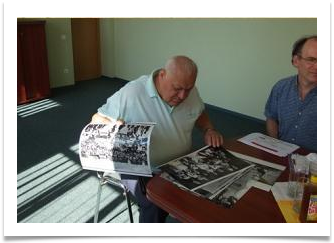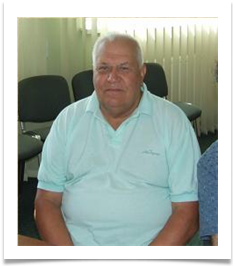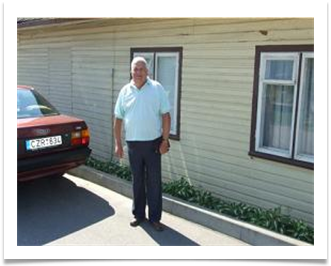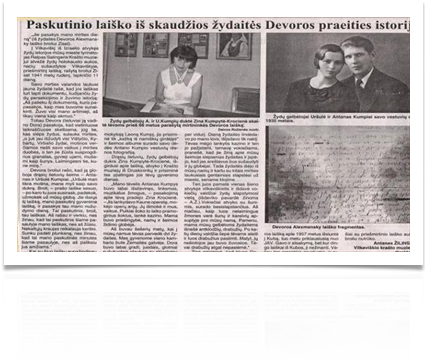Mr. Kumpis examining the pictures of Jewish Vilkaviski
Mr. Leonas Kumpis at the Mayor's office
Mr. Kumpis infront of the house where his aunt and uncle hid Dvora Olexsnanski
Ursula and Antanas Kumpis, the couple that hid Dvora Olexnanski
Later was to appear this article in the local Vilkaviskis newspaper
After reading this letter I felt that I should take a copy to Vilkaviskis. I showed the letter to Antanas Zliniskis [the Director of the Museum ] and he passed it onto Mr. Algirdas S Bagušinskas, Mayor of Vilkaviskis Mr.Bagušinskas together with Mr Zliniskas found the nephew of the Antanas and Ursula Kumpis, the Christian couple that had hidden Dvora

The Story of the last letter about the painful past of a Jewish girl Dvora
„They will tell about my day of death" (from the Jewish girls Dvora Alexmansky's letter to her brother Zisel).
The Israeli Jewish history researcher Ralph Salinger, came to Vilkaviškis and he brought with him the last predeath letter written by a Jewish Holocaust victim, who was shot in Vilkaviškis by the Nazis, to the regional museum. The letter was written to her brother Zisel in November, 11th 1941.
Waiting for the hour of her death, the young Jewish girl wrote that her letter must be the document that would testify about the history of Jewish persecution and punishment.
„I am leaving this document, to tell how we were exterminated. That all my relatives and friends died, and I remained the last stone."
Further in her letter Debora tells (Lithuanians called her Dora), that in local newspapers, there are advertisements that people who hide Jews would be killed.
„But all the Jews from Vistytis, Kybartai, Virbalis are already killed and Jewish women are forced to bring their children to the pits of death. They die in the pits from grenade explosions, and those still living are hounded and beaten like dogs. More happy are those who have already died."
Debora writes to her Brother, that the brave Lithuanian family, Antanas and Ursule Kumpiai, help her. „Ursule is to me like my real mother, she loves me like her own daughter. My brother, requests his sister in the letter, you have to find them after the war, thank them and pay them for their help. This is my last letter to you. I write to you crying because I know that this letter is the last letter to you in this world, and I will die. The blood of innocent victims asks for vengeance. It is hard to put down my pen, because I know that these minutes are the last for me in this world, because I will leave you for ever."
I (Ralph) presented this letter to the teacher Leonas Kumpis. Leonas remembered only that „he heard something from his close relatives", and he found his uncle's Antanas Kumpis wedding day picture in his family photo album.
The daughter of the brave Jewish rescuers, Zina Kumpyte-Krociene, found out about the letter, and came to the regional museum from Druskininkai. She remembered those special days from her parents life.
„My father Antanas Kumpus was a very educated, happy and musical person",- Zina Krociene started to her story about her father. - He liked to go to Kaunas operetta, he could sing some of opera arias. He also taught us to sing these arias. He danced very well, the ballroom dances of that time, and spent time at the casino. My mother was like an opposite person, the protectoress of the home fireside.
I was 6 years old when my father brought 2 Jewish girls to our home. We lived in a one room accomodation in Žemaites street. Dora was very pretty, she had black sleekly combed hair, with a path in the middle. During the day Jewish girls, hibernated under my bed. They used to go out only at night. My father liked to go to the casino and his acquaintances that worked for the Germans informed him that they knew about Jewish girls, that were hidden by our family. They warned us that if the girls were arrested that their helpers would be shot too. Then the Jewish girls left our house and together with other kinsmen that were awaiting their deaths, hid out of town in an old barn.
One man from Vilkaviskis who came for hay and saw Jews at that place, betrayed the Jews' hiding place to the Germans (the surname of traitor is known - A.Z.). The Germans came with dogs and found the hiding Jews. I saw how these unhappy people were herded alongside my house, surrounded by dogs and soldiers. I remember that my mother brought some clothes and blankets for the Jewish girls, that we tried to save. A few days later, the authority asked my parents to come and take those clothes. Probably the girls that wore the clothes were already dead. My parents didn't take the clothes back."
Zina remembered, that her father mailed Dora's letter to Cuba, that depended on the United States at that time. He received an answer, but she doesn't know where the letters from Cuba disappeared. Later the revolution started in Cuba and relations with the brother of the author of the predeath letter was lost.
Antanas ŽILINSKASVilkaviskis Regional Museum
Director
The article was translated from Lithuaian by
Virginija Vasiliauskiene
Associate Professor of Linguistics
Kaunas (Kovno) University
This site was built by Ralph Salinger of Kfar Ruppin, Israel
It is built to the glory of the Jewish Community of Vilkaviskis
You can contact me with any comments at salinger@kfar-ruppin.org,il
VILKAVISKIS
A small town in Southern Lithuania
Where the Jewish Community is no more
The Holocaust
The tradigic story of Dvora Olexsnanski - Who tried to help







